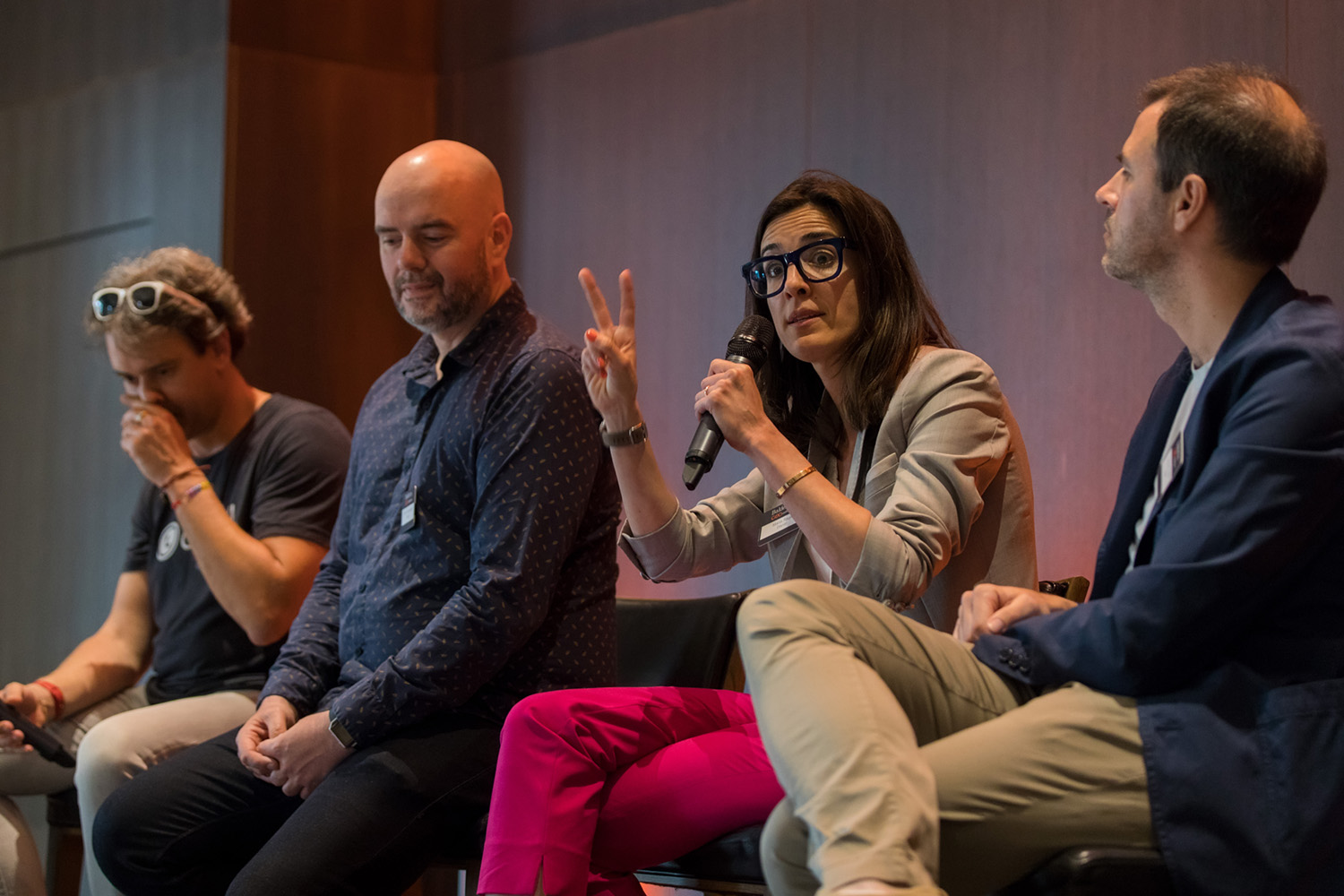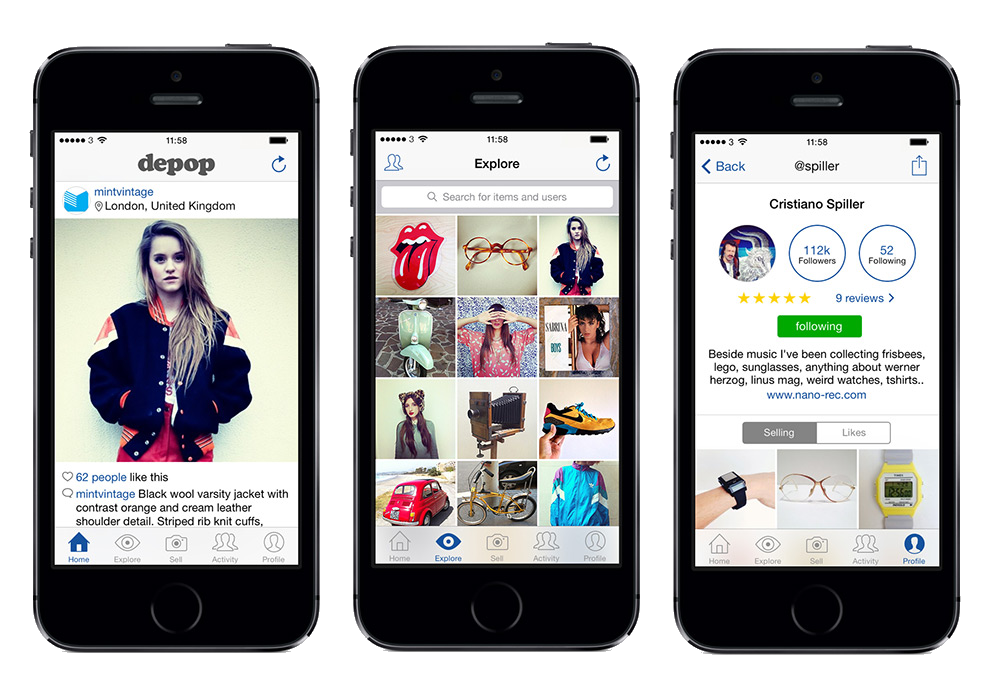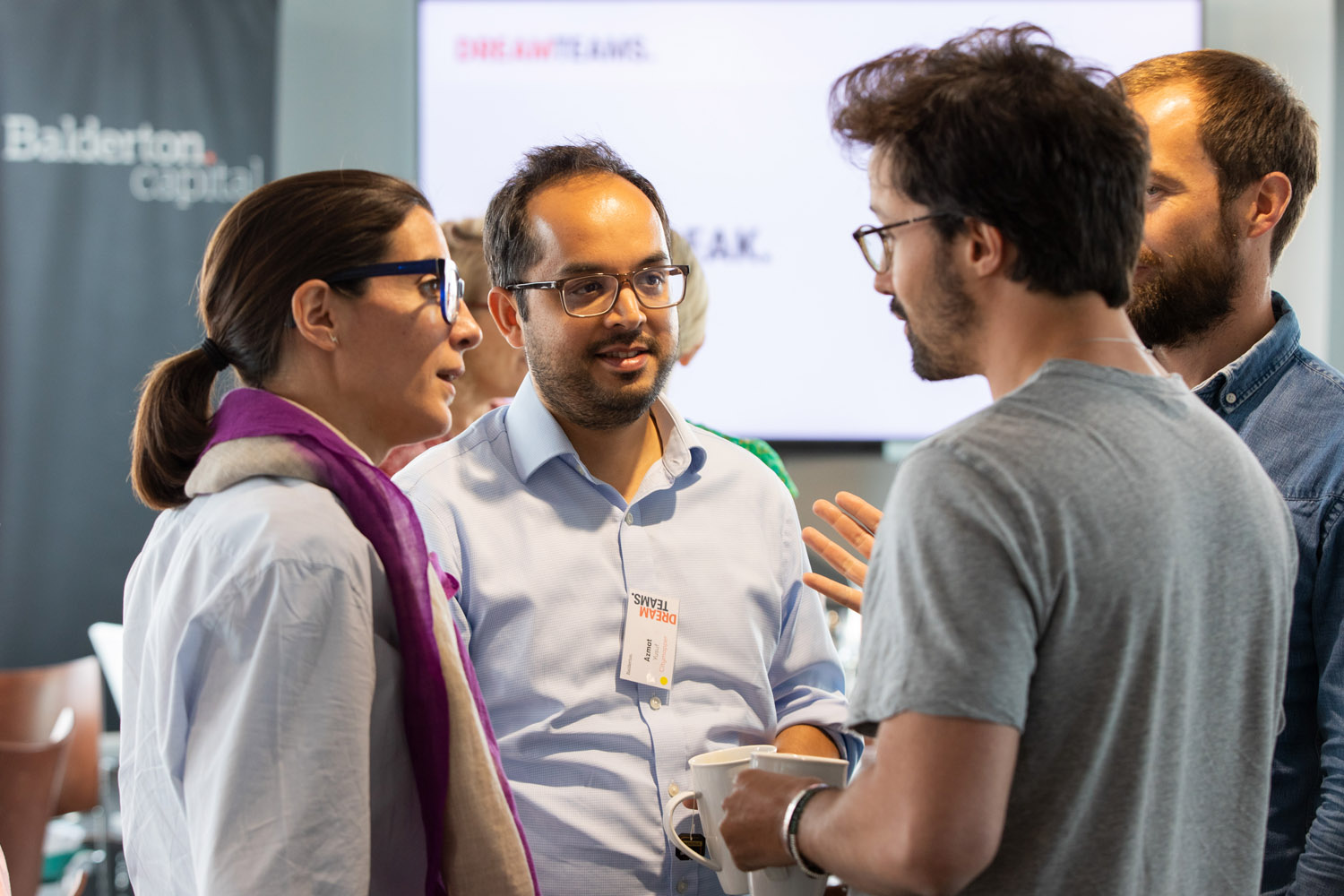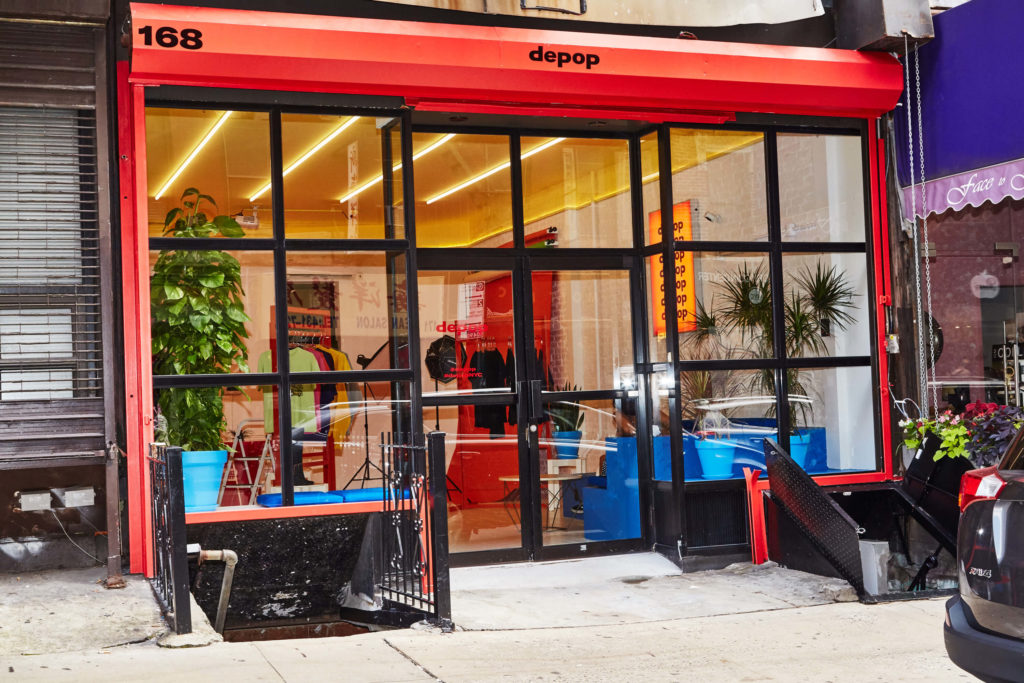Founder Interviews
Founded by Simon Beckerman in 2011, with a London HQ and offices in New York City and Los Angeles.
Depop is the fashion marketplace for the next generation. It is home to a community of 16 million+ creatives worldwide [as of Autumn 2019] buying, selling and discovering the best in vintage and second-hand fashion, rare finds and favourite brands.
To learn more about Depop: https://www.depop.com

Maria on stage with Olivier Pailhes (CEO, Aircall), Heini Zachariassen (CEO, Vivino) and Graham Cooke (CEO, Qubit) at the Balderton CEO Collective 2018
When I joined Depop, I came in as acting COO/CFO. My role was a mix of operations and finance. I became CEO in 2016.
When I took on the role of CEO, I asked Simon [Simon Beckerman, founder of Depop] to return to the company. He and I have a very collaborative and complementary dynamic, as well as a different skill set: Simon comes from a fashion and design background, whereas I come from the operations and financial world.
I’ve always been excited by Simon’s initial vision — to create independence and support creativity. It’s been a privilege to work with him to develop Depop from a place for people to find cool things in a mobile setting to a platform that empowers creative people to transform the fashion industry.
It's been a privilege to work with Simon [Beckerman] on his vision for Depop as a platform that empowers creative people to transform the fashion industry
There are three things that make Depop’s community unique.
First, Depop’s users are digitally native. They’re extremely connected to one another. They trust their social media circle and influencers more than they trust any brand.
Second, Depop's brand purpose. Being environmentally positive is way more important for Depop users than it is for older generations.
Third, we see this generation as savvier and more entrepreneurial than previous generations. They want to make money doing what they enjoy, they’re ambitious and independent, and to them, credibility and authenticity are absolutely key.

Depop is home to a community of 15m+ creatives worldwide who are buying, selling and discovering the best in vintage and second-hand fashion, rare finds, and favourite brands.

Maria with Azmat Yusuf (CEO, Citymapper) and Karim Kaddoura (CEO, Virtuo) at the Balderton 2019 Dream Teams Talent summit.
Our community is our most important asset. We aim to reflect the community in the most authentic way we can in everything we do.
In fact, most of our employees are active Depop buyers and sellers. They are always in constant dialogue with our community members. As CEO, I rely on my teams to make those first-hand connections.
Our community is our most important asset. We aim to reflect the community in the most authentic way we can in everything we do.
The first priority for me was the team. I re-approached people who had left Depop and re-engaged them on the Depop mission. Simon immediately focused on re-branding while I focused on the team.
The second priority was technical debt. The business was running nicely, but the platform hadn’t been developed in line with the business’ growth. So we went through a period of upgrading the platform rather than releasing many new product features. This process required decisions to decommission projects too.
My advice to other founders who might find themselves in this situation: concentrate on tackling these sorts of problems one at a time. It would have been impossible to solve everything at once.
Having enough time to get to know your investors well in advance, so they understand you and your business.
For example, at Series B [raised in early 2018], investors tend to look at your unit economics. At Depop, they looked largely at paid versus non-paid growth, and that required an understanding of our platform and customers. Obviously paid is the fastest way to grow because you deploy a lot of cash and you get a lot of customers. But for Depop this is complicated. First, when you have a low price point for an item (for example, an item costs $30 rather than $300), the unit economics are going to be different. Second, when you are building a community you have to be very careful about how you use paid because it compromises your authenticity.
So you need time with investors so they understand this sort of aspect of your business.
My advice to others on the journey to Series B is this: try to get to know your investors as soon as possible: even two years or at least 18 months before you raise your round.
I met our Series C investors well in advance and had established a personal relationship with them. I’d told them what I was planning and then later I was able to show that I had done what I said I would do.
Unfortunately, I didn’t have that luxury for my Series B investors, because, at that time, I’d only been a CEO for a year.
My advice to other CEOs: get to know your future investors as early as possible
My investors supported me as mentors, some meeting as often as once per week. I could discuss CEO role challenges, board priorities, and brand positioning with different investor mentors. Meetings became less frequent as challenges were solved.
When working with an investor, 'chemistry' is actually more important than one might think. In fact, when we were raising our Series C [announced June 2019] I asked myself: can I be transparent with this investor, if we encountered a problem? I’ve been lucky enough to have a very healthy dynamic with my board. This has been very important to our success.
One piece of advice I received is to never underestimate the value of promoting from within.
When I became CEO, we had critical C-suite roles to fill.
I made a number of internal promotions, which allowed people who knew and loved the business to rise to the challenge. Some didn’t work out long-term, but it was a great signal to the team and a big boost to morale.
From very early on we knew Depop had global potential and we believed that the United States would be a great stepping stone to a global footprint.
Gen Z is set to become the largest consumer group in the US, and trends towards reselling, 'circular' fashion, and social shopping are already evolving rapidly there.
Some of our growth was led by our community of influencers. For example, we were already experiencing organic growth in the US because one of our key influencers had moved to Los Angeles.
The US is a tough market in which to make an impact. But based on our experiences to date, we are hugely confident about what we can achieve there.

Depop pop-up community space, New York
You have to ensure you get the team fixed in head office before you can get it right elsewhere. While we were hiring rapidly in London, we didn’t have time to focus on getting the US team right at the same time. However, by 2017, when we closed our Series B, we were able to do it right. The difference to our performance was immediately obvious.
On expanding to new geographies: the team must be right in head office before you can get it right elsewhere
For us, it was a combination of the two.
First of all, you need to decide whether you want your international office simply to be about business development, versus about building another tech hub with product and other functions too.
We knew from the get-go that it would primarily be business development for us. That means community, sales and marketing. For that, you really need to have a local team because you need to understand the nuances of the market.
Culture is, however, also critically important. If you just build a local team separately, and you don’t have someone who’s acting as the liaison with the headquarters, then you can end up with two different companies.
First, make sure you already have traction before you go. If you launch without traction you will end up wasting a lot of time.
Second, make sure you have a clear differentiation strategy – and confirm there’s no one in the new local market who is like you. Or, have a very clear path to differentiating yourself. Otherwise, it's going to be a lot harder in the new market.
Third, have the right structure in your head office so that you can support those initiatives globally. For instance, if you’re going to do a marketing campaign locally, you need to have a strong marketing lead in your head office to make sure that the campaign is impactful. If you’re working separately it just doesn’t work.
Make sure you already have traction before taking on a new geo. If you launch without traction you will end up wasting a lot of time.
Retaining your culture is always ongoing work. And it’s especially critical when you’re growing the team at a fast pace. The most important thing is to identify what kind of culture you have in the business, and what's important to you.
We did an exercise early on to establish our values, which was lead by our People team. They ran workshops and established the things that mattered most to the whole team. Once this was established, the next task was to articulate what we learned in a set of values to be shared with the whole team.
We spent quite a lot of time crafting our values, but we found it to be really worthwhile.
Choose whatever is most authentic to you, as a company.
In our case, we have quarterly all-hands meetings. At those meetings, we award prizes based on how people are living up to our values.
This all has to be organic. It can't be the CEO 'telling' their team to care about something. Everyone has to live it. For example, one of our values is ‘We are the community.’ We approach questions we face by asking ourselves: ‘What would the community say or think about this?’ That is one of the ways we 'live' that value.
Communicate your values in the way that is most authentic to you, as a company.
Maria also chatted to Suranga at the 2018 Balderton CEO Collective, a biennial event that Balderton hosts to bring together all the CEOs in the portfolio.
Sign up for our newsletter to stay up to date on news from Balderton, and our portfolio.